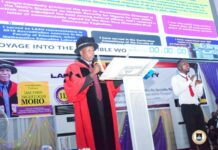In the bustling streets of Osogbo, the vibrant heartbeat and capital of Osun State, a unique tale unfolds each day. Amid the bustling routine of civil servants and ambitious entrepreneurs, a trio of young boys, aged between 11 and 14, captivates passers-by with spontaneous singing performances.
Recently, the boys, fuelled by passion and circumstance, created an open-air concert outside a popular restaurant in the city.
Their lyrics weave through the air, leaving onlookers enchanted and reaching for their smartphones to capture the daily spectacle.
Meet 11-year-old Waheed Adekunle, a charismatic member of this musical trio. As I inquired about their journey, he shared a story that spanned two years of dedication and resilience. Adekunle’s father, a person with disability, sits by the side, watching the children do their thing.
The removal of petrol subsidy by President Bola Tinubu has not helped matters. The removal of the fuel subsidy was supposed to boost the economy, after a brief period of pain, but for the urban poor who live balanced on thin margins, it is having a deep effect. To cushion the effect of this policy, the government has promised to increase the supply of grain and fertiliser, raise award a special allowances to civil servants, and supply palliatives to the poorest households.
But none of these have so far made a significant difference to the quality of life of most Nigerians, who are increasingly looking to God and their neighbours for support.
Dr. Sarah Aguocha, a child psychologist, said the nexus between poverty and child labour is complex. According to her, families trapped in the cycle of deprivation often see no alternative but to send their children into the workforce.
Aguocha said: “Education, which holds the promise of a brighter future, becomes an unattainable luxury. In this intricate dance between destitution and survival, the dreams of these children are pawned for the immediate relief of economic burden.”
Aguocha said the twin challenge of absence of proper legislation and enforcement of existing ones exacerbate the issue, allowing the exploitation of youthful vigour at the cost of their innocence. She said it was crucial for the society to acknowledge this silent crisis and work collectively towards breaking the chains that bind these young spirits. The psychologist said that through awareness, advocacy, and targeted interventions, there could be a Nigeria where every child is afforded the opportunity to learn, grow and chase their dreams.
Kolade writes for the News Agency of Nigeria.














